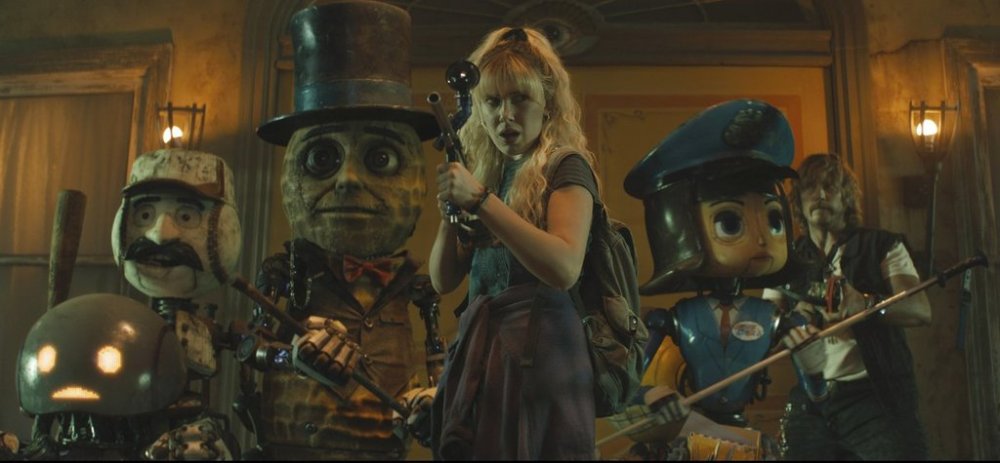Movie Review: Russo brothers’ sci-fi ‘The Electric State’ is big, ambitious and dull
Advertisement
Read this article for free:
or
Already have an account? Log in here »
We need your support!
Local journalism needs your support!
As we navigate through unprecedented times, our journalists are working harder than ever to bring you the latest local updates to keep you safe and informed.
Now, more than ever, we need your support.
Starting at $15.99 plus taxes every four weeks you can access your Brandon Sun online and full access to all content as it appears on our website.
Subscribe Nowor call circulation directly at (204) 727-0527.
Your pledge helps to ensure we provide the news that matters most to your community!
To continue reading, please subscribe:
Add Brandon Sun access to your Free Press subscription for only an additional
$1 for the first 4 weeks*
*Your next subscription payment will increase by $1.00 and you will be charged $20.00 plus GST for four weeks. After four weeks, your payment will increase to $24.00 plus GST every four weeks.
Read unlimited articles for free today:
or
Already have an account? Log in here »
Hey there, time traveller!
This article was published 12/03/2025 (216 days ago), so information in it may no longer be current.
If an algorithm designed a classic, big-screen spectacle for the small-screen age, “The Electric State” probably wouldn’t be too far off the mark.
This is an Amblin-inspired, big-budget adventure with dystopian, science-fiction wonder, nostalgic callbacks, well-liked stars (Chris Pratt! Millie Bobby Brown! Stanley Tucci! Giancarlo Esposito! Ke Huy Quan!) and the directors ( Joe and Anthony Russo ) behind some of the highest-earning movies of all time.
In theory, it should work. A kid on a dangerous, cross-country journey with a robot that may or may not be her brother whom she thought was dead? A reluctant, jaded adult companion who’s quick with a one-liner? “The Electric State” should be some future Spielberg’s new favorite movie, the one that they’ll reference in their Oscars speech as the thing that made them want to make movies. And yet it’s lacking a spark and a soul that might distinguish it as memorable or special. Worse, considering everything it has going for it (including a reported budget that may have exceeded $300 million), “The Electric State” is kind of dull.

“The Electric State” was loosely based on an illustrated novel by Simon Stålenhag that was released in 2018 and quickly scooped up for movie adaptation purposes with Marvel veterans Christopher Markus and Stephen McFeely writing the script. Set in the early 1990s, this is a world in which service robots have risen up and demanded rights and freedom. The humans respond by going to war.
This four-year war is skimmed over in a montage at the start of the film and, by 1994, Mr. Peanut (Woody Harrelson) is signing a peace treaty with Bill Clinton and the remaining robots are exiled to rot in the desert. The human victory was attributed to the drone creations of a Steve Jobs-ian tech billionaire Ethan Skate (Tucci), who is soon hawking his “Neurocasters” to the public. They scoop it up and soon society is just a bleak wasteland of screen zombies content to let their avatars work while they relax and fantasize a way out of their downtrodden existence.
There are shades of “The Creator,” “WALL-E,” “Ready Player One” and many, many more films in here. But no one gets mad that something is derivative if it’s also good. It’s only when the kitchen sink references are so clear and come up so short that it becomes a real problem.
Brown plays Michelle, an angry, orphaned teenager who lost her entire family not in the war, but in a car wreck. The one she misses the most is her little brother Christopher (Woody Norman, giving the best, most emotionally authentic performance in the film), a reluctant child prodigy. One day, a robot of a cartoon character they used to watch together turns up at her foster home, speaking only in the character’s catchphrases. But after some gestures toward a photograph, she starts to believe that this robot is, somehow, Christopher, or at least someone who can lead her to the real Christopher. And thus starts their journey across America, and into the robot “exclusion zone” to figure out this puzzle. They soon team up with a war veteran/smuggler Keats (Pratt) and his snarky robot sidekick (Anthony Mackie, for your Marvel bingo card) and try to evade Esposito’s robot bounty hunter.
The robots they find in the exclusion zone are voiced by an army of celebrities you’ll go insane trying to place before angrily resorting to IMDb, including Harrelson, Hank Azaria, Brian Cox and Jenny Slate. Their designs are thoughtful and remarkable and should evoke a sense of awe in the viewer at the sheer ingenuity behind this film, where many of the most impressive shots seem to be the recreations of Stålenhag’s illustrations of dismantled, decaying robots. The action, however, gets mind-numbingly repetitive by the end of the bloated runtime.
Pratt and Brown, while fine individually, don’t really find their groove as partners on this journey either. Pratt is kind of just doing his thing and gets the few clever one-liners in the script. Brown, meanwhile, seems a little bored by yet another teen adventure role. And both ultimately look like movie stars in ’90s cosplay, which might be a metaphor for the larger failure of the movie.
“The Electric State” was, of course, not made by algorithm, which is an admittedly cheap shot for a Netflix original. Unfortunately, it just feels that way.
“The Electric State,” a Netflix release streaming Friday, is rated PG-13 by the Motion Picture Association for “sci-fi violence/action, language and some thematic material.” Running time: 128 minutes. One and a half stars out of four.
